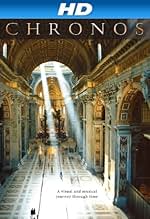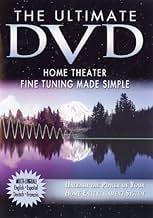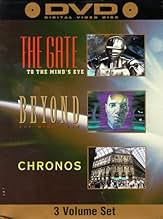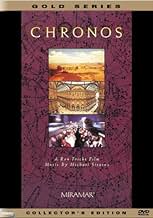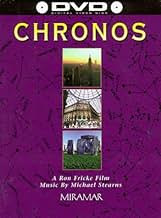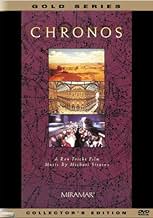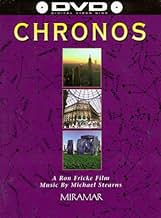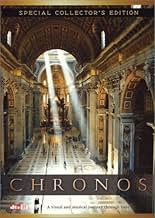ÉVALUATION IMDb
7,7/10
3,9 k
MA NOTE
Ajouter une intrigue dans votre langueCarefully picked scenes of nature and civilization are viewed at high speed using time-lapse cinematography in an effort to demonstrate the history of various regions.Carefully picked scenes of nature and civilization are viewed at high speed using time-lapse cinematography in an effort to demonstrate the history of various regions.Carefully picked scenes of nature and civilization are viewed at high speed using time-lapse cinematography in an effort to demonstrate the history of various regions.
- Director
- Writers
Histoire
Le saviez-vous
- AnecdotesComposer Michael Stearns used an instrument called the Beam to generate many of the sounds for this film, which is 12 feet long made of extruded aluminum with 24 piano strings from 19-22 gauge. The original instruments it was based upon were made from cast iron and difficult to move around.
- ConnexionsReferenced in Silicon Valley Timelapse (2008)
Commentaire en vedette
Space, time and matter. While the first might have started at the birth of the universe and the later is created and destroyed everyday, time stands alone. It cannot be undone and if there is anything that can resist time, it is time itself. In this sense time is the most mysterious. Is it even real? Is it only a creation of mankind to explain the beginnings and the ends? In Greek Mythology, Chronos is known to be the god of time. In this sense, Ron Fricke is trying to unite both conceptions of time through vast, open spaces and closed, personal areas. In his film, he tried to put the matter and space in perspective, showing that time had a greater influence.
When it came out, Chronos was considered as a very advanced, an "ahead of its time" kind of movie. The ground breaking Koyaanisqatsi was nearly 5 years old. The technical attributes of the movie were far greater than what could be found in popular, conventional cinema. The synthesized music was relatively new to the world and Michael Stearns was already establishing himself as both a leader and a pioneer in the ambient music department, even creating a particular instrument for the film. And of course, when Chronos came out back then, similar movies were hard to find.
Needless to say: Chronos relied heavily on the overall technology of 80's.
Nowadays, the technical attributes found in Chronos have been beaten by other movies. Music can now be created with complex, yet easy to use programs by using extremely effective computers which can produce an almost infinite number of sounds, effects, etc.. And finally, there are many similar movies nowadays, and we can find time lapse captures everywhere from typical Hollywood movies to televised advertisements.
This now leads people to believe that this movie is unoriginal, lacking depth and that the music is not good. As ironic as it sounds, Chronos is slowly being killed by time itself, whether it be real or not. But that does not mean that the movie is now bad today. Of course, there are obstacles that the viewer must surpass in order to view the movie and to think " Let's compare it to other movies in the 80's ".
When criticizing this movie, many people will compare it to Baraka ( which was made many years later, must I add ) and automatically point out the obvious: It's always the same areas, the music is always the same, the overall "message" is lacking.
Fricke didn't have the budget he had for Baraka. Stearn's music was innovative and fresh at the moment and yes, there is a "message" in Chronos, you just didn't take the "time" to see it.
In Baraka, the message concerning spirituality and humanity is easier to understand for a simple reason: Ron Fricke did it on purpose. The most important religions and areas of the world are shown. The whole movie is made in a way to connect with the entire world. In this sense, Baraka is a movie about the Earth and its inhabitants and what is around and beyond it. You will notice that in Baraka there are things you can easily understand and point out while there are others more obscure themes that you might not even notice.
Chronos is far more complicated for the viewer. While Baraka is still an experimental film, it is not an abstract film. Chronos is both an experimental and abstract film. In this sense, it is way harder for the viewer to acknowledge Chronos to actually have a meaning and to make something out of it.
This shows how Ron Fricke truly is a mastermind when it comes to giving other people the opportunity to come out with their own interpretations of his movies. A short comparison with Geoffrey Reggio ( Fricke's partner ) can be made. While Reggio builds his movies on a specific message which make the viewer think after watching the films, Fricke chooses to make the viewer think while he his still watching. Most viewers will often try to find a meaning to Chronos after watching it or they will try to associate a specific series of scenes.
Of course, Chronos is not as good as Baraka. I believe everyone can agree on this. But everyone should all agree that Chronos was some sort of cinematic homework for Fricke. Not only was it his first own film, but he was also stepping on a different kind of path than Reggio's. He actually found his own path, his own style, a cinematic trademark. And for this originality and advance in film, Chronos deserves to be considered as a good movie. Not the best, but one of the good.
When it came out, Chronos was considered as a very advanced, an "ahead of its time" kind of movie. The ground breaking Koyaanisqatsi was nearly 5 years old. The technical attributes of the movie were far greater than what could be found in popular, conventional cinema. The synthesized music was relatively new to the world and Michael Stearns was already establishing himself as both a leader and a pioneer in the ambient music department, even creating a particular instrument for the film. And of course, when Chronos came out back then, similar movies were hard to find.
Needless to say: Chronos relied heavily on the overall technology of 80's.
Nowadays, the technical attributes found in Chronos have been beaten by other movies. Music can now be created with complex, yet easy to use programs by using extremely effective computers which can produce an almost infinite number of sounds, effects, etc.. And finally, there are many similar movies nowadays, and we can find time lapse captures everywhere from typical Hollywood movies to televised advertisements.
This now leads people to believe that this movie is unoriginal, lacking depth and that the music is not good. As ironic as it sounds, Chronos is slowly being killed by time itself, whether it be real or not. But that does not mean that the movie is now bad today. Of course, there are obstacles that the viewer must surpass in order to view the movie and to think " Let's compare it to other movies in the 80's ".
When criticizing this movie, many people will compare it to Baraka ( which was made many years later, must I add ) and automatically point out the obvious: It's always the same areas, the music is always the same, the overall "message" is lacking.
Fricke didn't have the budget he had for Baraka. Stearn's music was innovative and fresh at the moment and yes, there is a "message" in Chronos, you just didn't take the "time" to see it.
In Baraka, the message concerning spirituality and humanity is easier to understand for a simple reason: Ron Fricke did it on purpose. The most important religions and areas of the world are shown. The whole movie is made in a way to connect with the entire world. In this sense, Baraka is a movie about the Earth and its inhabitants and what is around and beyond it. You will notice that in Baraka there are things you can easily understand and point out while there are others more obscure themes that you might not even notice.
Chronos is far more complicated for the viewer. While Baraka is still an experimental film, it is not an abstract film. Chronos is both an experimental and abstract film. In this sense, it is way harder for the viewer to acknowledge Chronos to actually have a meaning and to make something out of it.
This shows how Ron Fricke truly is a mastermind when it comes to giving other people the opportunity to come out with their own interpretations of his movies. A short comparison with Geoffrey Reggio ( Fricke's partner ) can be made. While Reggio builds his movies on a specific message which make the viewer think after watching the films, Fricke chooses to make the viewer think while he his still watching. Most viewers will often try to find a meaning to Chronos after watching it or they will try to associate a specific series of scenes.
Of course, Chronos is not as good as Baraka. I believe everyone can agree on this. But everyone should all agree that Chronos was some sort of cinematic homework for Fricke. Not only was it his first own film, but he was also stepping on a different kind of path than Reggio's. He actually found his own path, his own style, a cinematic trademark. And for this originality and advance in film, Chronos deserves to be considered as a good movie. Not the best, but one of the good.
- Credo_Quia_Absurdum
- 14 mai 2008
- Lien permanent
Meilleurs choix
Connectez-vous pour évaluer et surveiller les recommandations personnalisées
Détails
- Date de sortie
- Pays d’origine
- Site officiel
- Langue
- Aussi connu sous le nom de
- Хронос
- Lieux de tournage
- sociétés de production
- Consultez plus de crédits d'entreprise sur IMDbPro
- Durée43 minutes
- Couleur
- Rapport de forme
- 1.78 : 1
Contribuer à cette page
Suggérer une modification ou ajouter du contenu manquant


